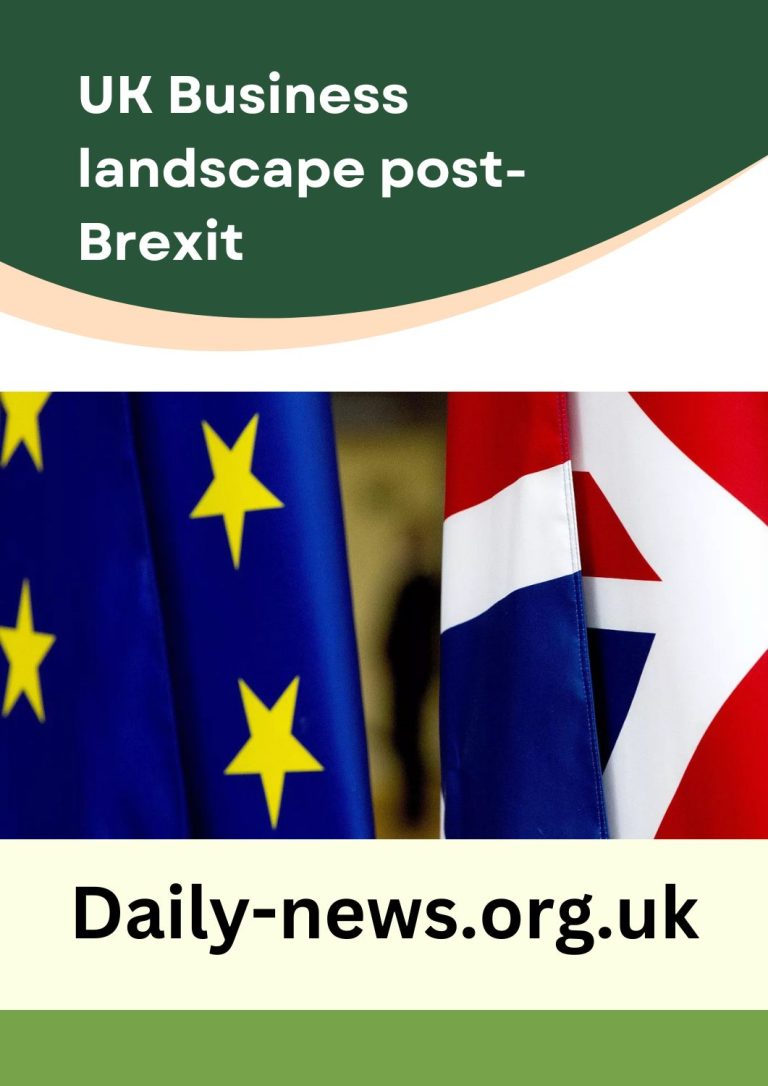UK business landscape post-Brexit is facing fundamental changes. Brexit has significantly reshaped the UK business landscape.
With the UK no longer part of the European Union (EU), companies across various sectors are navigating new regulations, trade agreements, and market dynamics.
Here we explore how businesses in the UK are adapting post-Brexit, focusing on key areas such as trade, labor market, and regulatory changes.
You May Also like : How Climate Change Policies Are Impacting the UK Economy
Trade Adjustments
New Trade Agreements
- Diversifying Trade Partners: Post-Brexit, the UK has been actively seeking new trade agreements. Deals with countries like Japan, Canada, and Australia aim to offset the loss of frictionless trade with the EU.
- UK-EU Trade Relations: The Trade and Cooperation Agreement (TCA) governs the UK’s current relationship with the EU. Businesses face new customs checks, tariffs, and regulatory compliance issues, which require strategic adjustments.
Supply Chain Reconfiguration
- Local Sourcing: Many businesses are shifting to local suppliers to mitigate delays and increased costs associated with EU imports.
- Tech Integration: Companies are investing in technology to streamline supply chain management and improve efficiency in customs processing.
Labor Market Changes
Workforce Mobility
- Skilled Worker Visa: The introduction of the Skilled Worker Visa has impacted hiring practices. Businesses must now navigate the points-based immigration system to hire talent from the EU.
- Talent Retention: Efforts to retain and upskill the existing workforce have become crucial. Companies are investing in training programs to bridge skill gaps.
Employment Practices
- Remote Work: The pandemic accelerated the adoption of remote work, which Brexit has further cemented as businesses look to maintain productivity while navigating new labor regulations.
- Diverse Recruitment: There is a push towards more diverse and inclusive recruitment strategies to ensure a resilient and adaptable workforce.
Regulatory Landscape
Compliance and Standards
- Regulatory Divergence: The UK is gradually diverging from EU regulations, creating a need for businesses to stay updated on new standards and compliance requirements.
- Financial Services: The financial sector is particularly impacted, with firms needing to adapt to new rules on data protection, financial reporting, and market access.
Business Support
- Government Initiatives: The UK government has launched various initiatives to support businesses during the transition. Programs offering financial aid, training, and advisory services are crucial for small and medium enterprises (SMEs).
- Innovation Funding: Increased funding for innovation and research is helping businesses develop new products and services to compete globally.
Market Dynamics
Consumer Behavior
- Changing Preferences: Consumer behavior has shifted, with a growing preference for locally produced goods and services. Businesses are adapting their marketing strategies to align with these trends.
- E-commerce Growth: The rise in e-commerce, accelerated by the pandemic, continues post-Brexit. Companies are enhancing their online presence to reach a broader audience.
Competitive Landscape
- Startups and SMEs: The post-Brexit landscape has seen a surge in startups and SMEs leveraging new opportunities in the market. These businesses are agile and can quickly adapt to changing conditions.
- Global Expansion: Larger companies are exploring global markets beyond the EU, with a focus on emerging economies offering growth potential.
The UK business landscape is undergoing a significant transformation post-Brexit.
Companies are adapting through trade diversification, reconfigured supply chains, new labor market strategies, and navigating a changing regulatory environment.
While challenges persist, opportunities for innovation and growth are also emerging, making adaptability and strategic planning essential for success in the post-Brexit era.


